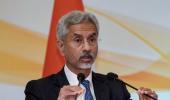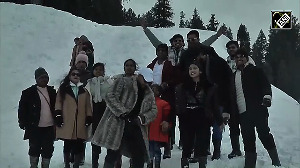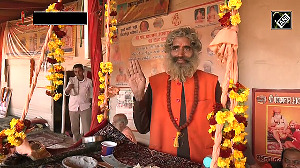'There is a view that there is a Pakistan angle to this. Pakistan has a large presence in Qatar and would want India to be blacklisted.'

"Diplomacy is all about give and take. Many Arab countries are vying for space in the Indian market. India is among Qatar's biggest oil and gas importers," says leading defence and security expert Maroof Raza.
A former officer in the Indian Army, he served in the Grenadiers and Mechanised Forces and has undertaken counter intelligence operations during his career in the army.
He holds a Master's degree in War Studies from Kings College, London and an MPhil in International Relations from Cambridge University.
"It will not be sensible for Qatar to cut off the Indian market by ruining relations or blacklisting India and punishing our naval officers," Maroof Raza tells Rediff.com's Archana Masih in a phone interview.
Why has been such secrecy about that trial?
From what I understand there are several elements involved in the charges against the Indian Navy veterans.
Firstly, the company they were working for has wound up which has put them in a tight corner because the employer itself doesn't want to take responsibility.
Secondly, there are many rivals companies competing for business in Qatar. They have their own agendas and are looking for scapegoats. This has made Doha a battleground for business rivalries.
Each entity is trying to push the other out of the arena and a company can be blacklisted if its employees are suspected to be spying.
Thirdly, it is difficult to believe that all eight ex-Indian Navy veterans employed by the company were spying. How can that be possible?
All the naval officers have impressive service and professional records, so why would they sacrifice their life's worth for a few thousand dollars?
Usually, such operations are more reminiscent of the Russian system wherein spies are infiltrated and sent in with a mission to find out what they can about the enemy country.
Fourthly, Qatar is a friend of India with strong business ties. The emir of Qatar was among the first Arab leaders to visit India after Mr Narendra Modi came into power. So why has it suddenly turned against India?
Some may argue it is because of certain statements given by Mr Modi and his team in favour of Israel after the Hamas attack, but the navy veterans were put under arrest more than a year before the Hamas operations.
They have been in custody since August 2022, but the Indian government and the Indian mission in Qatar have not been able to move the case forward.
Fifth, I also believe this is an exercise to blacklist India.
The Pakistanis have a large presence in Qatar. There is a view that there is a Pakistan angle to this.
Pakistan has a bigger submarine programme than India because they don't manufacture subs, but get them from China which then becomes part of the Pakistani fleet.
Pakistan would want the Indians out of Qatar.
These are some of the reasons that seem to be behind the sudden death penalty.
The sentence is from a lower court and can be turned around in due process.
How can diplomacy help at this stage in their release? The MEA said it will contest the wording.
Do you think the naval officers can still be released?
Diplomacy is all about give and take. Many Arab countries are vying for space in the Indian market. India is among Qatar's biggest oil and gas importers.
It will not be sensible for Qatar to cut off the Indian market by ruining relations or blacklisting India and punishing our naval officers.
In diplomacy there are other ways of exercising pressure. For example, there are around 8 lakh Indian immigrants in Qatar -- in fact without our immigrants these countries will come to a standstill.

You mentioned that Indian diplomacy has been unable to push the case forward.
Is it a failure of Indian diplomacy that despite good diplomatic and trade relations and the strong Indian community, we've been unable to resolve this?
Failure is a harsh word. Ever since the Indian Navy men were put under arrest, our diplomatic wheels should have been working overtime.
We want to play a global role, but our diplomatic corps is small. Even a small country like Singapore has a bigger diplomatic corps than ours.
Therefore, maybe our staff was overstretched working on the Middle Eastern Economic Corridor because it's the big ticket deals that people get credit for. Diplomats don't get credit for saving lives.
In 2004, three Indian truck drivers were kidnapped in Iraq.
Talmiz Ahmad, India's then ambassador to Oman, and Zikrur Rehman, another diplomat stationed in Delhi at that time, were flown in. They were both Arabic language experts and led the charge that resulted in the release of the captives.
In 2014, our diplomats in Baghdad [Ambassador A K Amban and B B Tyagi] were able to rescue Indian nurses held hostage by ISIS.
We have done it in the past and have the ability to secure the release of the naval officers.
India's footprint is becoming bigger in the world and therefore the expectations from Indian diplomacy are high.
There has been an idea that entry into the Indian Foreign Service should not begin and end with the UPSC entrance exam.
Language experts can be taken on by the ministry of external affairs as consultants. There are institutions like JNU and Jamia Milia Islamia which impart language and region courses. The problem in India is that people do a PhD without thinking what they will do with it because there are only a few post-PhD openings.
If the MEA provides opening to scholars of Islamic Studies or Gulf Studies, they can provide great help while the power still remains in the hands of the Foreign Service officers.
This will increase the IFS staff strength and also enhance capacity to respond to crisis situations with insightful information.
What according to you are the difficulties and challenges of dealing with espionage cases in a foreign country?
Espionage cases are very hard to track down. Spies are trained and funded to cover all the ends to ensure that their identity is not uncovered easily.
They are backed by a very efficient and well-funded central system. A lot of money exchanges hands in espionage without which spies can't go past the barriers.
They have to constantly cultivate new sources. Their sources in turn have to be very careful because if they are caught passing information, there is every possibility of a death penalty.
Not many volunteer for cross-border espionage, therefore, people with an inbuilt anger or mission within their heart have to be identified and trained as spies.
Just as defence needs expenditure so does espionage and counter espionage.
Therefore, the charge that the eight Indian naval veterans are spies doesn't fit at all.
- Part 2 of the Interview: 'Securing release of ex navy men will be tough'
Feature Presentation: Aslam Hunani/Rediff.com











 © 2025
© 2025